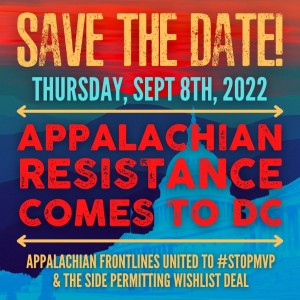From an Article by Ellie Silverman, Washington Post, August 23, 2022
The project is now years behind schedule and billions of dollars over budget. Natalie Cox, a spokeswoman for Mountain Valley Pipeline said in a statement that “MVP is being recognized as a critical infrastructure project that is essential for our nation’s energy security, energy reliability, and ability to effectively transition to a lower-carbon future.” Cox said the project has faced “unprecedented” scrutiny, “undergone rigorous review and evaluation” and “the final authorizations have exceeded regulatory and legal requirements for infrastructure projects.”
Joe Lovett, executive director of Appalachian Mountain Advocates, said his organization will continue to challenge the pipeline in court. Nevertheless, he said, the Inflation Reduction Act’s passage was progress for the climate movement. “It’s a first step this country has been unwilling to take,” Lovett said. “I just wish [Manchin] understood that the Mountain Valley Pipeline is counter to all the aspirations of climate in that bill.”
Indigenous activists coming to D.C. with a message for Biden: Declare a national climate emergency
In southern West Virginia, Maury Johnson stopped using his well water in 2018 for cooking, drinking and washing clothes because of turbidity, meaning the water was clouded with sediment. When it was clean enough, he’d use it for bathing. But last August, he said, it became “nonusable for anything” and he turned off the pump. He blames the Mountain Valley Pipeline, which he said is crossing a section of his 150 acres of land that has been in his family for several generations. A Mountain Valley Pipeline representative said there was no support for Johnson’s claim that the project impacted his water, according to an August 2021 filing with the Federal Energy Regulatory Commission.
Maury Johnson plans to join his neighbors and other climate advocates in the nation’s capital next month to rally against this pipeline and other fossil fuel infrastructure. “This is more than just about the Mountain Valley Pipeline,” said Johnson, 62, a retired farmer and educator, and co-chair of POWHR. “This is about the Gulf Coast, North Alaska and every community that has been sacrificed for decades. We can’t continue to sacrifice communities and people.”
Joye Braun, 53, plans to travel from her home in Eagle Butte, S.D., to stand in solidarity with people from Appalachia, like Johnson, at the rally. She hopes to recruit others to join her, too, like those opposing the Willow project in Alaska, which would new oil infrastructure to the middle of Arctic tundra and wetland.
Braun said she is especially concerned with the side deal, including the easing of permitting restrictions. She said this could weaken an important environmental protection law Indigenous people have frequently used to challenge projects they believed would harm their communities.
“It’s going to cut out tribes. It tramples on our rights to have meaningful consultation,” Braun, a member of the Cheyenne River Sioux and a national pipeline campaign organizer with the Indigenous Environmental Network. “We, as Indigenous people, have already sacrificed a lot for this country. We’ve sacrificed in lives. We’ve sacrificed in lands and water.”
Jennifer K. Falcon helped organize the protest last month at the Congressional Baseball Game, less than 24 hours after the announcement of an agreement between Manchin and Schumer on the spending package. Despite the immediate reaction from many people in the climate movement who were celebrating the news, Falcon said she and other Indigenous activists wanted to protest. Falcon, 39, a climate advocate with the Ikiya Collective, an Indigenous woman-led collective of organizers in Texas, Oklahoma and New Mexico, will be rallying in D.C. next month, in hopes someone in power will hear their concerns — and act.
“It’s a long-standing tradition of front-line folks having to leave the fights in their own communities … to go and advocate for themselves in D.C.,” said Falcon, an enrolled citizen of the Fort Peck Assiniboine and Sioux Tribal Nations. “Because D.C. is not listening.”
#######@@@@@@@&&&&&&&@@@@@@@#######
NOTE: “Appalachian Resistance Coming to D. C.” on Thursday, September 8, 2022

